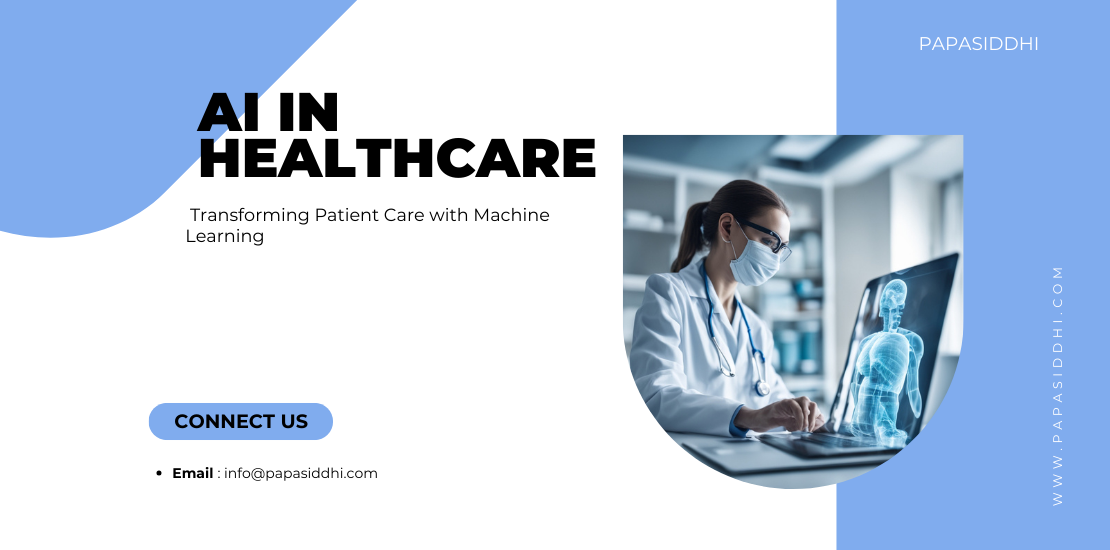- February 16, 2024
- Posted by: papasiddhi
- Category: Artificial Intelligence

Introduction:
In recent years, the integration of artificial intelligence (AI) into healthcare has been a game-changer, revolutionizing the way patient care is delivered. One of the most powerful tools within AI is machine learning, a technology that enables computers to learn from data and make predictions without being explicitly programmed. Let’s explore how machine learning is reshaping healthcare and enhancing patient outcomes.
Understanding Machine Learning:
Machine learning is like a smart student that learns from examples. Just as a student learns to recognize patterns in math problems, machine learning algorithms learn patterns in healthcare data. These algorithms analyze vast amounts of medical data, including patient records, lab results, and imaging scans, to identify trends and make predictions.
Early Disease Detection:
One of the significant advantages of machine learning in healthcare is its ability to detect diseases at an early stage. By analyzing medical records and diagnostic tests, machine learning algorithms can identify patterns indicative of diseases such as cancer, diabetes, and heart conditions. Early detection allows healthcare providers to intervene sooner, leading to better treatment outcomes and improved patient survival rates.
Personalized Treatment Plans:
No two patients are exactly alike, and machine learning recognizes that. By analyzing patient data, including genetics, medical history, and lifestyle factors, machine learning algorithms can create personalized treatment plans tailored to each individual. This personalized approach improves treatment efficacy and reduces the risk of adverse reactions to medication.
Predictive Analytics:
Machine learning can also predict future health outcomes based on current data. For example, algorithms can assess a patient’s risk of developing complications during surgery or predict the likelihood of hospital readmission after discharge. By identifying high-risk patients, healthcare providers can intervene proactively, potentially preventing adverse events and reducing healthcare costs.
Enhanced Medical Imaging:
Medical imaging, such as X-rays, MRIs, and CT scans, plays a crucial role in diagnosing and monitoring diseases. Machine learning algorithms can analyze medical images with incredible accuracy, helping radiologists detect abnormalities that may be missed by the human eye. This enhances diagnostic accuracy and reduces the time taken to interpret imaging results, allowing patients to receive prompt treatment.
Challenges and Considerations:
While machine learning offers immense potential in healthcare, it’s essential to address challenges such as data privacy, algorithm bias, and regulatory compliance. Protecting patient data and ensuring the fairness and transparency of AI algorithms are critical priorities in the development and deployment of machine learning solutions in healthcare.
Conclusion:
Machine learning is transforming healthcare by revolutionizing patient care delivery. From early disease detection to personalized treatment plans and predictive analytics, AI-driven technologies are improving diagnosis, treatment, and patient outcomes. At Papasiddhi, we are also harnessing the power of AI to develop innovative solutions for healthcare providers. If you are looking for similar AI-driven solutions tailored to your specific needs, we are here to help. Contact us today to explore how we can collaborate to create cutting-edge AI solutions for your organization.
Leave a Reply
You must be logged in to post a comment.
